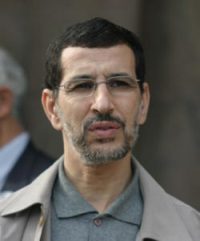Islamist party willing to change values among Morocco's youth claims to win elections
The leader of the Islamist party claims to win Morocco's parliamentary elections next month, saying the party desires a bigger role in educating Morocco's youth as it tries to change values in the moderate Muslim nation.

But despite its electoral strength, the Justice and Development Party, which calls for a return to Islamic values, will face opposition from Morocco's secular king and government.
If victorious, the party will seek to streamline Morocco's public administration, root corruption out of its courts and improve education, Saadeddine Othmani, the party's leader, said in an interview Wednesday.
"We will win - no question about it," he told The Associated Press in an interview.
A 2006 poll by the Washington-based International Republican Institute showed 47 percent of Moroccans supporting the PJD in elections scheduled for Sept. 7 - giving it more support than any other single party. Polls are rare in the North African kingdom, but observers say Justice and Development still has strong backing.
Formed in 1998 from several Islamist strands, the PJD rose to prominence in the last parliamentary elections in 2002. With 42 seats out of 325 in all, the PJD is parliament's third-largest party after the governing coalition dominated by the establishment Istiqlal, or Independence, party and the center-left Socialist Union of Popular Forces.
The reformist message of the PJD, as the party is known by its French initials, has struck a chord with Moroccans fed up with rampant corruption and a stagnant economy. But to its opponents, the party is made up of Islamic hard-liners in moderates' clothing.
Last spring, the government redrew the electoral map in what the PJD condemned as gerrymandering designed to blunt the PJD's expected victory.
The PJD wants to reorient Morocco's state-run universities toward providing a work force for investors, Othmani said. Many of Morocco's legions of unemployed are young graduates educated for public sector jobs that don't exist.
However, control of education would also give the PJD leverage to push traditionalist values - something Morocco's secularist King Mohamed VI, who names the government and wields ultimate power, is unlikely to allow.
Othmani rejects that the PJD has an Islamic agenda, likening it to Christian Democrat parties in Europe. But the PJD's history of loudly condemning behavior it deems un-Islamic has earned it a reputation as national scold.
The party has softened its rhetoric considerably in recent years, leading some supporters to complain that it did so in exchange for access to politics. The country's largest Islamist movement, Justice and Charity, remains banned from taking part in politics.
Othmani brushed the notion aside.
"To be able to make necessary changes is a strength," he said, adding that Morocco's main left-wing parties have similarly dropped their former Marxist stance.
"We would never seek to curtail personal liberty," said Othmani. "When we talk about moralizing public life, we mean things that have an impact on society in general, such as drunk driving and sex tourism."
The PJD has frustrated critics by leaving vague just where it draws the line between private freedoms and societal issues. One thing is certain, Othmani said: "Morocco is a Muslim country - it can never be Western."
Subscribe to Pravda.Ru Telegram channel, Facebook, RSS!


